[The Occidental Observer (TOO) contributor and scholar Andrew Joyce on the “jewish problem/question“, has a wide-ranging discussion with Revision Media’s Paul Stevenson, including the recent US elections; Joyce’s upcoming two books; Nick Griffin; Christianity – all within the context of jews and jewish power and influence.
— KATANA]
Revision Media
Andrew Joyce
Infiltrators of Western Civilization
Mar 14, 2021
Click here for the video:
https://www.bitchute.com/video/t8UZRznTg8sM/
Published on Mar 14, 2020
Bitchute Description
REVISION MEDIA – ANDREW JOYCE – INFILTRATORS OF WESTERN CIVILIZATION
52:20
Jan 20, 2021
First published at 14:52 UTC on March 14th, 2021.
Repository
4 subscribers
This airing we have Andrew Joyce joining us. Andrew Joyce [Ph.D.] is a historian who documents and explores the role of Jewish influence, both currently and historically. Andrew is author of the book “Talmud and Taboo” and a writer for The Occidental Observer and The Occidental Quarterly, which provide in-depth articles on Western history and culture. Andrew has written articles from a variety of perspectives, including intellectual history, evolutionary biology, behavior genetics, and both religious and ethnic studies. We discuss a number of currently relevant issues regarding Judaic power, control, totalitarianism, censorship and Jewish supremacy across the economic, academic, social and political landscapes. Some related topics are also included. Callers are welcome to contribute. This weekly radio show broadcasts live every Thursday from London, England, transmitting independent philosophy, news and perspectives. Paul advocates an independent lifestyle encompassing nationalist and traditionalist values. Revelation featuring Paul Edward Stevenson ~
_____________
TRANSCRIPT
(59:20 mins)
[00:00]
Music.
[01:15]
Paul Stevenson: Hi and welcome to Revision Media with me here tonight, Paul Stevenson, on this Wednesday, the 20th of January 2021. I’ll be live with you here for the next hour, or I should say I won’t exactly be live, because I’ve got an interview coming up this evening and we’ll get to that in a couple of minutes. But it’s an interview I recorded earlier in the day with Professor Andrew Joyce of The Occidental Observer.
But welcome to the show. I hope I find you well in these very precarious times. The days of lockdowns, and masks, and hypocrisy, and audacity, at levels we’ve never witnessed. And just the double standards of these clowns that are coming into the White House on this, you know, inauguration day.
And I mean, some of the scenes there are just ridiculous. It’s just military everywhere. I mean, I don’t know where to start, but I’m not going to go too much into, because I want to crack on with the interview. And, as I say, that is with Professor Andrew Joyce he’s the author of Talmud and Taboo. He’s a prolific writer he writes for The Occidental Observer and the Occidental Quarterly.
And he’s quite a difficult guy to get. And so, I’m thrilled to have him on the show here tonight, or to have interviewed him earlier for airing it on here tonight. So, without further ado, we’ll just get into it. As I say that’s Andrew Joyce from The Occidental Observer. So this is the interview I did with him earlier today. So it’s not out of date. It’s not a few days ago. It’s exactly about six hours ago. So I hope you enjoy that interview.
[03:20]
Paul Stevenson: I’m with historian and writer at The Occidental Observer, Andrew Joyce. He’s a prolific writer and historian. And I believe that you’re also working on a couple of books you mentioned on email. Do you want to just give us a quick analysis of that, Andrew, the books you’re working on? And then we’ll get into the other stuff we mentioned.
Andrew Joyce: Well one is finished and is sitting with Richard Spencer at Washington Summit Publishers. That’s just basically a collection of, or a volume, of essays that I’ve written that are introduced with a 10,000 word introduction, providing an overview of jewish history.
So anyone who’s been following any of my writing over the last almost 10 years at The Occidental Observer will be familiar with the type of content that’s going to involve. The second book which I have an agreement to publish, …
Paul Stevenson: That is Talmud and Taboo isn’t it?
Andrew Joyce: Yes. It’s been renamed “On the Jews”.
Paul Stevenson: Okay.
Andrew Joyce: And the second book which I’ve called The Foundations of the 21st Century. And I have an agreement to publish with Arktos Publishers, is basically a political philosophy unique to me. It’s where I see the world. It’s my worldview in total. So there is a chapter on jewish issues. But there’s also chapters on, for example, feminism, or relations between the sexes, on mass immigration, on economics, on the technology question, and so on, and so forth.
So that book will basically be, if you have any inclination whatsoever to find out how Andrew Joyce sees the world, some of you will think that’s a good thing, the more sensitive among you might think that [chuckling] my world view is very twisted indeed! But that will be an insight into sort of a coherent systematic way of me looking at the world.
So it’s something very different. And all of that content will be brand new. It’s just being a busy man, I try and find as much time as I can for podcasts, I try and find as much time as I can to write essays for The Occidental Observer, and between all of that, and the activities and tasks of day-to-day life, it’s trying to find time to finish these books.
One wishes that one had all the time in the world to complete these things. But being a wage slave this is the sort of the longer time span that it’s taking me to complete these things. So all I will say is, stay tuned. It will be published at some point in the future.
[05:46]
Paul Stevenson: All right. Where can we find those books?
Andrew Joyce: Well, the first one isn’t published yet, that I was talking about, but it will be published by Washington Summit Publishers. The second one will be published by Arktos who have been publishing a lot of stuff, very, very good stuff recently. And I’ll be reviewing some of that shortly for The Occidental Observer. But when they’re published I’ll provide all the necessary links through social media, and so on, so that people can go and purchase them as soon as possible.
Paul Stevenson: All right, okay. So the last time we spoke we were talking about censorship, and we were also talking about Charlottesville. And, as I said, just off air, Charlottesville, the Capitol building is just Charlottesville all over again on steroids. And they’re now actually censoring, not Andrew Joyce, not Paul Stevenson, not E Michael Jones, but the President of the United States! And that even though I’m aware of jewish aggression and audacity, it’s just unprecedented this year, just want to comment on that?
Andrew Joyce: Yeah, this morning I was having a conversation with Nick Griffin. And we were talking about the assault on big tech. And what one of the big things that’s happened over the last four years that we were discussing is the Left wing always did have an unhinged element to it.
But over the last four years we saw the start of it with “Trump Derangement Syndrome”. But it’s reached a hysteria. Now part of that hysteria is genuine. A lot of the Dems and these liberal types and soyboys do have a feminized nature. They are overly sensitized. And some of the things that Trump has said, and some of the ways that’s been twisted in the media to make it look even worse, has caused them to have extreme reactions. And they do go into sort of a fearful and emotive panic.
But there’s also an element that’s always been there where there’s a kind of “knowing hysteria” by which I mean, that certain organizations and certain interested parties – and we know who these people and individuals are – are quite content to act hysterical, and to pretend like Nazis are coming down Pennsylvania Avenue. And all of this is with the express intention of shifting the Overton Window in their direction, and in, as Kevin MacDonald’s phrase goes, in shaping “ways of seeing”.
They want the lexicon that we use to describe our politics to shift dramatically in favor of their politics. And one of the offshoots that we’ve seen recently of all of this activity has been that there has been a change in the terminology from describing our politics simply as bigotry, or simply as racism, or ignorance, towards describing what we’re doing is “terroristic”, “criminal”, and so on, and so forth. And all of this cultural change the shaping of ways of seeing.
This change in the language has had the effect of softening up certain bodies, particularly the tech industry, but also believe me it’s going to move into the judiciary, and into the interpretation of existing laws very, very soon. All of this has the effect of paving the way for mass censorship.
And I’ve noticed in recent years, in particular I’ve been writing about it since 2016, probably 2015 actually, is that organizations like the Anti-Defamation League in the United States, organizations like the Community Security Trust in Britain, or the Campaign Against Anti-semitism, or the Board of Deputies of British jews, or the Council of jewish German citizens of the jewish Faith. All of these international bodies are very much interested in censorship. And they’ve stopped going after individuals, and individual videos.
I mean, you’re talking there earlier Paul, about how the last podcast that we recorded. One of which was on jewish history, the other was on sort of jewish responses to Charlottesville. Those videos were very, very quickly censored on YouTube. And it’s actually very difficult for anyone to have an interview with me on YouTube regardless of how careful and polished my language might be, regardless of how well referenced the things that I’m discussing are! They will be removed very quickly.
[10:16]
Well, we’ve seen an evolution from that stage where videos and people are banned to whole platforms, and indeed the President being banned. So they’re not going after Johnny Troll on Twitter anymore. They’re basically putting massive pressure on Twitter itself and threatening them with sanctions, or they’re not trying to censor individual users on Parler. They want Parler itself deplatformed. So the scale of censorship has extrapolated massively since Charlottesville. And again the warnings were made, not many people listened.
And unfortunately, as I was tweeting recently, polarization is good if there’s a genuine pendulum effect in terms of action between the poles. So you have Right-wing action which provokes a harsh Left-wing response which in turn provokes a Right-wing response of equal, or more serious gravity. The problem of the last four years has been that while Trump has ushered in a period of massive cultural change – and there has been a cultural shift there almost to the point of there being some kind of revolutionary potential within that great mass of the GOP voter body.
What we have actually – this is disappointingly seen – is that there’s kind of been a pendulum between token gestures from the Right and massive action from the Left. So token gestures and saying we’re gonna clamp down this on migrants, and Trump with the Muslim ban, or whatever. These are kind of token efforts really when all is said and done in terms of how reversible these things are, and in terms of how meaningful they are even at that stage. That swings into massive media overreaction! Into massive agitation for legal challenges and so on, and so forth.
And the Right for the last four years has not been able to swing back to pendulum with anywhere near the force that the Left has done. And the result of all of this is that we have a massive body of legitimate voters in the United States who have been more, or less, declared “terroristic”. Whose politics has been declared beyond the pale. And it’s hard to see at the minute – and to be honest, I don’t have a totally black-pilled attitude on any of this actually – I think there’s a lot of grounds for optimism.
But right now it’s like we’re seeing the absolute pinnacle of this upswing and left action. We see Biden come into office. He’s put 18 so-called engaged jews into the Cabinet. And by “engaged jews” I would interpret that to mean that they are zionist. That they are fully on board with the censorship agenda. And these people are occupying positions like the Department for Homeland Security, or head of the CIA. They’re not messing around anymore! This is a culmination of years of agitation and working.
And they have used Trump in a way, at the Left. And they have for all the waves that he was creating they have rode those waves into office. And now it’s a kind of wait and see, to see how all this unfolds.
[13:19]
Paul Stevenson: Yeah, well there’s no doubt about it. I mean, they have seriously made their move. And, as I said, we mentioned the aggression and the speed of it in the last 12 months. But I think that it could be a good thing. I mean, do you, because you have these institutions being sewn up now. And yet is that voter base that you mentioned, Trump’s voter base is a real force even if they do get manipulated. And Trump has been manipulated.
But for every action there is a reaction. And so they’re bringing in the fight. I mean, there’s been sparring for, you know, it’s like it’s a boxing match, they’ve been feeling each other out for 10 rounds. And now it’s going into, you know, it’s going toe-to-toe. I mean, I think secession is something, which is possible. I mean, I don’t know whether I can actually see a civil war.
But when you look at the two forces in the United States just say – we’ll look at Europe in a minute – there’s no common ground there. And any civilization I think which doesn’t even have any ethnic, or cultural cohesion, and now just no political cohesion and agreement. How can this continue, you know? Something has to give!
Andrew Joyce: Something has to give. But let’s go back to this analogy of the boxing match. Right, we do have two broad ideologies we do have two poles that are coming toe to toe. That’s true. The problem is that one of the ideologies, one of the opponents if we stick to this boxing analogy, insists on tying at least one of the hands of his opponent, behind his back. And this tying is happening in a number of ways.
We’ve got the Tech censorship. We’ve got the kind of and even within the GOP, there’s this kind of establishmentarian agreement that certain subjects, and certain actions, and certain provocations, will now be off limits. And, as I said, declared quasi-terroristic, or at least dangerous to the establishment, to the Constitution, and what have you. They will portray patriots as unpatriotic. This is the ironic and paradoxical situation which we’re now seeing unfolding.
[15:38]
But there are other problems afoot. I mean, yes we can talk about secession, but the most recent news coming out of the Biden camp is that one of his first actions is going to be to grant a massive amnesty, at least to around 11 million migrants. But there are projections that’s going to affect a much larger proportion, a much higher number, much higher proportion of the population. And that in turn there will be a kind of softening of the borders, once more severe softening of the borders to the extent that there is within the next four years of massive migrant influx into the United States.
All of that and Nick Griffin had pointed this out an article he wrote in November for the Unz Review called “Wither America – the Moment the Republic Died”. Nick Griffin points out that it’s not going to be the blue states that all of these migrants are going to gain their citizenship. All these Mexicans are going to be in places like Texas, or New Mexico. A lot of the red states.
And automatically, … And it’s not dyed in the wool, not all of the Mexicans are going to vote Democrat, because some of them, because of hostility towards abortion, for example, will vote Republican that will continue. But they’ll vote for a Republicanism that’s kind of anodyne, that’s kind of bleached of any ethnic patriotism, of course. So even when they vote Republican it will be with a soft edge.
But predominantly I think we can agree that most of these new migrants will vote Democrat. They’ll vote with the welfare budgets. They’ll vote with what the material provisions can be provided to them. So that they very well may become a massive Democrat voting base, within the red states.
So the red states in terms of their being able to vote themselves into a state of secession, or even push themselves onwards, towards some kind of state of civil war. And I’m not saying that a civil war would even be the best idea to be honest. But I don’t think it’s going to be cut and dry. I don’t think that, that yes, there’s a definitely a massive competition going on the minute between ideologies. But I think it’s quite nuanced. And I think that there are no easy ways of disentangling ourselves from some of these complexities.
Paul Stevenson: Yeah you mentioned there earlier that people didn’t listen. A century ago Henry Ford wrote the book, The International Jew and no one listened then, either. And he talks in here about “audacity”. Is it as simple as extracting jewish power and influence from Western civilization? Because to me, that would seem to really create an opportunity for stability. Because, I mean, they are the people who are causing the destruction. And yet no one mentions them. And Henry Ford warned about this a century ago. And people still aren’t mentioned the jewish influence.
Andrew Joyce: Yep. I mean, let’s get back, let’s strip back to basics, first of all, when we talk about jewish influence in Western societies.
Jews possesses, let’s just say jews possess a certain suite of characteristics. One of which is, as Kevin MacDonald has pointed out, psychological aggression. And the other being above average intelligence. Both of those things mean that they are very efficient workers in obtaining and acquiring power. Together, of course, with ethnocentrism. Because then it’s a team effort.
So those things automatically mean that you have, given that these jews, you know, possess a contrary ideology, shall we say, and then in conjunction with those characteristics, then you have a very, very capable opponent. And when they’re particularly adept at wealth acquisition, on obtaining resources, your problems multiply further.
So whenever we talk about removing jewish influence, or challenging it, jewish influence is always, yes it’s standalone. But it’s always integrated into a wider system, because jews themselves are numerically small element of the population. That is primarily throughout historical time, been their weakness. And so they rely on networks of allies, normally elite allies. When the elites let them down as they did in Russia at the end of the 20th century, then they forged new allies. So that could be through a communist elite, or an entirely different elite.
[20:31]
But they’re quite fluid in strategies. And when I say “strategies”, I don’t mean that they gather in meeting rooms and come up with a set of Protocols of what to do in that particular year. But what I do mean is that even on an individual basis, an ideological jew will know what’s in his best interests, and will aggressively pursue them.
Now if we were able to click our fingers and remove the likes of, well he’s now removed himself I suppose, or death has, Sheldon Adelson from the equation, you’ll still be left with the structure in which jews are integrated. And it is an unfortunate fact that although we are in opposition to very much of what jews are doing in modern society, that there is a systemic problem.
And that there are people – and people like Edward Dutton have described them as “mutants” – they are sort of these maladaptive people who over time have come to adopt these spiteful attitudes towards the healthy, and the normal, and the beautiful. These people will still exist and they will still have a kind of revolutionary potential within them as well. A tendency towards degradation. A tendency to towards the fermenting of declining culture and so on.
But certainly when we look at some of the most harmful aspects of what’s affecting society right now, which is the rampant consumerism, the debt-based culture, pornography, and the general decline of morals, there’s little point in denying that jews have been, being themselves highly intelligent and aggressive, at the forefront, of so many of these moves.
So again, I would have to answer that question with some nuance, and say even if we could click our fingers and remove every stridently ideological committed and highly identified jew, that we would still have some way to go to fixing the deep existential problems that have wracked Western civilization, probably since the French revolution.
Paul Stevenson: Yeah. Because the system is so badly infected now that even if you remove the problem it would still be sick, if I could use that kind of analogy. It would eventually probably recover, but it would take it would take a lot of time, basically.
If you could point to a period in history as the pivotal turning point for the decline and the destruction that Western civilization has seen, what would it be would it be? Would it be the Federal Reserve coming into the United States?
Andrew Joyce: Well it would be hard to pinpoint a certain stage, or a certain year, at which the decline really began. I believe certainly in the broad view that a lot of our modern problems can be traced to the mass migration of Ashkenazi jews from the Russian Empire to the West, to the United States, and elsewhere, beginning really in the 1880s, and ending about 30 years later.
Paul Stevenson: Yeah.
Andrew Joyce: During that time you basically have a massive objective social problem that had made a nuisance of itself in the Russian Empire for at least a century, or two. And it undergoes a massive demographic boom. It’s well trained in things like money lending, and credit, and sort of, I suppose, cultural manipulation, you could say in a way. And in the forging of ties with elites. And for various reasons, one of which is that they kind of outgrow their own resources.
We get these pogrom narratives which emerge. Some of which are justified, many of which, and most of which are not justified, and are, in fact, complete inventions and embellishments. Riding a crest of manufactured sympathy, millions, upon millions, of these jews migrate to the West! And once there, some of them involve themselves in starting to promote bolshevism. Others begin selling pornography. And just generally involving themselves in the trade in vice, in the growth of their financial power.
[25:08]
The second generation moves into the professions. They have a devastating effect on academia. They have a devastating effect once they get into the media and acquire newspapers and control over television stations. And they push their own political agenda.
And that political agenda isn’t strictly Left, or Right, because as we’ve seen with the Trump and Biden change over, the one thing that hasn’t changed despite this superficial sea change between left and right. One thing that hasn’t changed is that the administration remains zionist. It remains committed to censorship of opinions beneficial to the native White majority of the United States. And there’s a certain core set of interests and goals which will continue to be adhered to!
And I remember years ago, I think it was during the Nathan Cofnas affair. Cofnas was making the argument that there are no such thing as jewish interests, or at least he was saying that Kevin MacDonald is saying that the work of the Frankfurt School, for example, could not be perceived as being in tune with jewish interests. Because certain, you know, promoting communism, he was saying, wasn’t in tune with jewish interests. But these are all superficial matters of nomenclature and terminology.
Nathan Cofnas
When you actually scratch beneath the surface there are no contradictions, no paradoxes. And in actual fact there’s this very, very steady adherence to core principles within the jewish community.
And any native White American, or European, or Australian, or what have you, in trying to push for their interest, it’s natural, it’s not even a conscious engagement in hostility, they’re just naturally going to come into conflict with contrary ideologies, with contrary interests and goals.
I mean, I wrote a few months ago a long essay, nearly 9,000 words, on the merits and inadequacies of this middle man minority theory, and explaining the jews. And one of the founders of that theory. And, in actual fact, in the late 1960s early 70s, a Marxist American historian called Edna Bonacich, and she was jewish. She said that you can come up with all kinds of explanations you want for the phenomena like anti-semitism. You can say that it’s self-generated, but really it’s quite clear to see that what’s going on here is a clash of interests. And it’s not particularly the fault of any one people. It’s just that there is a clash of interest. Jews have separate goals from us! They have separate things that will benefit them.
We can go back to Barbara Roche, for example, the politician and Tony Blair’s Labour government who said that she just felt safer and more at home in a multicultural street in London, than she would if it was all White people.
Paul Stevenson: Yeah.
Andrew Joyce: This is a kind of a naturalistic way of looking at it. This is the way things are!
Paul Stevenson: Yeah. Whatever’s in their interest. It was interesting that Douglas Murray mentioned Barbara Roche, and he identified her as a jew, as well, and then backed off from it. But anyway! [chuckling]. His work though is worthwhile I think. Some of the work Douglas Murray’s done, you know.
Andrew Joyce: Like a lot of gatekeepers, Douglas Murray is useful only in so far as he doesn’t close the door.
Paul Stevenson: Yeah.
Andrew Joyce: Of someone moving on further. And the problem with a lot of gatekeepers, and you’ll find this normally with sort of free speech types, is you’ll get someone who comes up.
I mean, in the UK they have this Lawrence Fox guy. And that Lawrence Fox will say controversial things about transsexuals. And he’ll say controversial things about woke, diversity, and British period dramas appearing on the TV. But Lawrence Fox himself has come out and declared other opinions to be beyond the pale.
So that’s a gatekeeper that’s useless! That’s a gatekeeper that will funnel votes into something that’s not going to go anywhere. That’s someone who is trying to protect his own little niche, and make some money by delineating the fact that he is not XY, or Z. He is saying:
“I want free speech to be able to say this. But we should all agree that we shouldn’t give free speech to these people!”
Paul Stevenson: Yeah!
Andrew Joyce: So Douglas Murray I’ve always perceived in that way. Add to the fact that he’s, shall we say, “one of them” [homosexual] [chuckling]. Yeah, you know, I don’t know, the “The Strange Death of Europe” is a good book. Don’t get me wrong it’s a fast, easy, punchy, good book. I haven’t read The Madness of Crowds. I have no inclination, or intention of doing so.
But certainly “The Strange Death of Europe” is a good gateway book, as I said, in my review. My problem with Murray is just that I see him increasingly as someone who is a dead end gateway.
[30:00]
Paul Stevenson: Yeah, well there’s quite a few of them and, as you say, they believe in free speech, you know, and unless it gets, how should you put it? You know, too edgy, or unpalatable. And then they’ll be quite quick to throw you under the bus at that point.
Andrew Joyce: Oh yeah.
Paul Stevenson: Right. You were you mentioned there that you were speaking to Nick Griffin about tactics and stuff. So we could touch on that again. I’ll just quote [Henry] Ford it says at his time:
“Judah has begun the struggle. Judah has made the invasion, let it come. Let no man fear it, but let every man insist that the fight be fair. Let college students and leaders of thought know that the objective is the regency of the ideas and the race that have built all the civilization we see, and that promises all the civilization of the future. Let them also know that the attacking force is jewish!
That is all that will be necessary. It is against it is against this that the jew protests. ‘You must not identify us’. They say you must not use the term ‘jew’. Why? Because unless the jewish idea can creep in under the assumption of, other than jewish origin, it is doomed!”
Now, so he said that is all that will be necessary. Have we gone beyond that, because of what we said about their entanglement and the wider systematic and institutions of Western civilization? Or what did you and Nick Griffin come up with?
Andrew Joyce: Well. I mean, we were talking tactics in general I suppose, rather than jewish matters specifically. But what you’ve quoted there from Ford, and it’s been a long time since I read Ford. But what he says there is very, very strikingly similar, in fact, to what Hillaire Belloc writes in The Jews. And I think Henry Ford might have published The International Jew maybe in 1920, maybe 1921. Hillaire Belloc published The Jews in 1922.
In a lot of ways it’s a more sober, more reflective book, and probably a better book to be honest. It’s certainly one of the best books on the subject that I’ve read. Not many people have read it I did do a very long, I think almost ten thousand word, review of it for the Occidental Observer, because it was on sale for a time as part of Amazon’s Forgotten Books series. So it was back in print.
I think that my review actually may have prompted certain bodies to put pressure on Amazon to remove it from print. So, I’m not actually sure. So when we finish this conversation, perhaps go and look it up. I certainly will just out of curiosity to see if it’s still for sale.
But in The Jews Belloc does say that one of the fundamental ways of moving forward from the sort of the anti-semitic state of affairs. He describes it as a tension, or a friction and society between jews that is natural between them and the host population.
He said the only way to remove this, isn’t through sort of expulsion and segregation and all these different things. It’s simply to get things to throw them all forward, to cast them all in front of you, to ventilate them, and let a discussion take place. Avoid the friction, rather than always covering it up, which builds tension and which must itself eventually escape. And normally, because it’s bottled up for so long it escapes in very dramatic and often violent fashion. This was Belloc’s theory.
So what Ford and Belloc are both saying there is that we need sort of public discussion. We need to be able to say look, in the context of major mainstream media, to be able to have a debate and say:
“Is it healthy, for example, that Biden has, already 18 confirmed quote-unquote ‘engaged jews’ in the cabinet?”
A massive over-representation relative to their numbers in the population! And perhaps not so overrepresented when we look at who’s sort of in charge of the finances, and who’s really influential in America. But that influence in itself we need to put back into perspective and say:
“Is this desirable? Is this good? Is it good that we have this ongoing commitment to Israel? Is it good that we have so many of our media executives preaching diversity, yet in themselves as viewed as a community not diverse in the slightest, they’re all part of the same Ashkenazi ethnic group, many of them intermarried, or interrelated!”
So there is something to be said for that. Yes, in an ideal world that would be a good idea, that would be something worth doing. But we should always come back to the fact that these writers were writing a century ago.
Paul Stevenson: Yeah.
Andrew Joyce: And they were writing at a time where certain laws which are now in place did not exist. They were writing at a time when you could say certain things and make certain proposals, without fear of either massive social ostracism, or the threat of imprisonment. We’re facing all those things and more.
[35:00]
So simply going around and saying:
“We need to be able to chat about the jews.”
Is not going to affect anything, anymore! We are long past that stage. And it may well be that in dealing with the issue of jewish influence we have to go around the subject. It may be so impossible to go through it anymore.
This doesn’t mean that we all stop talking about jews. This doesn’t mean that we don’t write about the history. That we don’t analyze the contemporary situation. That will always be a place for it. Webzines like The Occidental Observer, or individual people like David Duke, what have you. Or a Michael Jones who want to say what they want to say about jews. There will always be a place for that.
But in terms of creating a mass movement, or channeling mass energy of the type that Trump has managed to almost inadvertently, let’s face it, because his actual concrete policies can’t really be held responsible for the massive enthusiasm. It’s part personality, it’s part balled up desire among the American population just to see someone like Trump!
Paul Stevenson: Yeah!
Andrew Joyce: And so a lot of projections onto his personality, and onto him, and what he’s done has taken place. There’s a lot of projection there.
Paul Stevenson: I’m really glad you said that actually. It’s a really good point. Because I couldn’t agree more. But it’s almost by accident, or just cult of personality that he has just had this mood, this bottled up tension, and anger, and frustration just projected on to one man, whose ego loves it!
Andrew Joyce: Yeah. Yes. So accident, or not, what Trump has done is he has created a kind of revolutionary pool of anticipation and latent action, which has not been channeled so far into anything ultimately productive.
Now the question then, if we come back to what we’re talking about, is this is the way forward for that massive pool of people to go to them and say we need to start talking about jews? I’m not convinced. There are a number of overlapping problems there some of them will have a religious affinity with jews, based on all kinds of corruptions from their scriptures, and so on, and so forth.
And on top of that there is a massive cultural indoctrination project, which has been ongoing for a long time, really since the Second World War, which has made those ideas the ultimate taboo.
So when you’re trying to bring those people down a path you don’t hit them with the final destination straight away. They have a bit to go on the journey, before they get to that stage.
So we need to figure out what are the other landmarks on the journey that they need to reach. And that’s part of the problem.
The other problem is that at the minute this there is this massive pool of revolutionary potential. But it’s very delicate, and it’s quite dissolvable, and it could once again just disappear into a massive silent so-called “silent majority”. So what do you do there you have to solidify it.
And what Nick Griffin has suggested in his article that was published at the Unz Review in November is that there needs to be a real solid, grassroots, connected movement built on kind of upper working class people. He’s talking about the, or lower middle class, the truck drivers, the farmers now, the people whose interests are under attack.
I mean, you’ve got these truck drivers who are often self-employed, who are ambitious people, prudent and sober for the most part, hard-working who have a potential to be kind of leaders at the local scene. And their jobs are under threat. Their jobs are under threat from technologization. They’re talking about moving the entirety of the trucking industry into kind of automated trucking now. How far away that is difficult to set this stage. But it’s coming down the line.
And what that will do is America, … I don’t know if you’ve ever been there. But I lived there for long periods, and you need to drive almost everywhere you go. And everything relies on driven freight in terms of delivering groceries and so on, and so forth. And supplies and raw materials. Truck drivers are a massive element of the sort of lower middle class with America. And so it’s a way for relatively uneducated people to make a decent salary. And when their jobs go it will be a kind of another massive blow to the White population.
So there’s a core of potential there. And ditto for the farmers. I mean, we’ve got this climate change nonsense which just keeps escalating in all different directions. This anti-meat drive where they’re wanting us to move on to a diet of bugs and so on. And some of its been overplayed. And some of it is kind of pipe dream thinking on the part of the Left. But it’s still there. And it’s an antagonism. And it’s kind of black propaganda against farmers.
So there is a potential there. But it’s how to bring those people along, further along the journey. And it’s not going to be easy, it’s not going to be quick. But there are grounds for optimism in the fact that we’re against a very obvious, and very radical left government now.
Whereas with Trump you’re kind of, you’re moving through mud! You’re surrounded by, you’re just in a thicket of conflicting ideologies, you’ve got all kinds of Right-wing patriotism that are shot through with zionism and other kinds of kind of wokeness, and promoting gays in Africa, and all the rest of it! So we’re out of the thicket now, where we should be able to see things clearer. And that is a grounds for optimism.
[40:26]
Paul Stevenson: Yeah. The other, of course, the other big difference and challenge that the writers of Belloc and Ford didn’t have to face at that time is, of course, the huge demographic shifts that we’re now facing. That has occurred since that century, you know. I mean, it’s demographically unrecognizable from a century ago, both in Europe and the West, or in the United States.
Andrew Joyce: And it’s accelerating. I mean, I saw a couple of tweets recently which I agree with and I tweeted myself saying basically, look there’s no immediate way that we’re going to be able to stop Biden from going ahead with this amnesty. And amnesting so many millions of illegal immigrants. And then, basically softening up the borders to allow in millions more.
Some people are saying it could affect 40 to 50 million people and coming into America, or acquiring citizenship, and so on.
And equally with the events now, in the UK, where they’re talking about granting residency status to over five million Hong Kong Chinese overnight. And in addition to the fact that immigration has not slowed one bit!
Paul Stevenson: Accelerated!
Andrew Joyce: In fact, accelerated. And we see the same issues in Germany and France, and so on, all the way all the way through the European continent, except the kind of the Poland, Hungary, Czech Republic, that sort of ripping off, off towards the east. But the rest of us would be very, very badly affected.
There’s no immediate way that we’re going to be able to stop this. That’s not a black pill that’s just basically accepting reality. Is that there are no laws going to be passed within the next year that stop that happening. So it’s coming!
So strategically, as a movement, and as I suppose as a culture, we’re a culture as much, or a subculture, as much as a political movement at the moment. There needs to be a conversation that moves increasingly in the direction of kind of White entrenchment. Or if you don’t, you know, some people even in our circles don’t like the view of us all is just White.
But in terms of our individual nationalism as well, you know, let’s view what does an entrenchment of the English look like? What is an entrenchment of the Scots, or the Irish, or the Welsh, or the French, or the Germans? What does it look like? We need to have those conversations. Because pipe dreams about an instantaneous reconquista, in the present context are at best wishful thinking, and worse the waste of time, exactly!
Paul Stevenson: What else did, … So let’s just look at Europe and what did you and Nick Griffin come up with regards to Europe?
Andrew Joyce: Well, Nick, I mean, I’m going to try and get a hold of the book. But Nick actually he showed me a book that he’s written, called Deus Vult, something like The Return to a Muscular Christianity.
Nick’s world view is sort of through the lens of Christianity. There’s nothing wrong with that.
Paul Stevenson: Is he a Christian?
Andrew Joyce: He is, yes. And he’s been heavily involved with the kind of the Christian patriot movements throughout continental Europe. And he is stripping it right back to basics in terms of what does the most grassroots level of White activism looks like. And it’s very, very basic stuff. I mean, he was talking about food banks, and charity shops, and mother and baby groups, people who kind of assist each other while providing each other with furniture, or finding somewhere to live. Community support that slowly builds up the political structure, that slowly builds up to lobbying groups.
But not with the heavy emphasis on political parties. Nick was saying that, look political parties in the present context – and he was saying this, of course, as Britain’s most electorally successful far-right politician ever – he was saying:
“Look the electoral angle I’ve been down further than anyone else. Eventually you get to a certain point of success where the State will try and destroy the party by destroying its reputation. So the two main parties will just gang up on that upcoming third party.”
So this is the first strategy. And, of course, in 2004 the BBC assisted by the British state put in a secret agent for a documentary called “The Secret Agent” in which they sent someone with to BNP meetings with a little recording camera on the lapel of their jacket. So they could record a few drunks saying a couple of controversial things on camera. And then they tried to expose it to the world.
So this was the first big strategy to disrupt the upcoming BNP. But it had the opposite effect I think the BNP after the documentary come out lost something like 11, or 14 members. But they gained over a thousand within the first week of the documentary showing.
[44:08]
So people were actually enthused by what they saw. They felt sympathy for the BNP in the way it had been infiltrated. And it was viewed by something like four million people. And one of those four million people was myself. I was a teenager at the time. It switched me on to Nick Griffin, switched me onto the BNP. So that didn’t work. Well two years later massive backing appears out of nowhere for Nigel Farage to become leader of UKIP.
And UKIP is the kind of the Trojan horse that comes in, it diverts a lot of voting energy and middle class sensibility from the BNP in towards UKIP. And the BNP basically dies through that form of kind of controlled opposition, whatever you want to call it. A diversionary process that is put in place.
So there are a number of strategies that existing establishmentarian parties can put in place to crush an up-and-comer. And this is the challenge that faces any up-and-coming electoral party from the Right, from the real Right. So Griffin was basically saying:
“Look going forward, yes have your political parties, but don’t put all your eggs in that basket.”
They are just kind of a veneer. I don’t want to be too cynical and saying that it gives a veneer of respectability, because our politics are respectable. But, you know what I mean. It’s a way, it’s a kind of anchor, or focal point around which the real movement can orbit.
And that in a nutshell was Nick Griffin’s philosophy. It’s what he’s outlined in his book.
I’m going to try and get a hold of the book, so I can read it and possibly review it for the Occidental Observer. And give his ideas a sort of a wider airing. Certainly in the United States where the focus of the movement is predominantly on this kind of online, quasi entertainment, slash social media scene. And outside of which is very little.
I know that there’s the National Justice Party which has been founded by Mike Enoch and his circle. And fair play to them for doing that.
But I think that Griffin’s ideas would do well with a hearing in the United States. But due to the nature of how you become I suppose popular within the American scene, Griffin either isn’t that well known. Because the movement tends to be, certainly is now younger than it ever has been. And a lot of people are just so young that they weren’t politically active at the time that Griffin was most active. Now sort of 15 to 17 years ago. So they’re like:
“Who’s Nick Griffin?”
So I think it falls upon those of us who are younger and who do remember the contributions Nick Griffin made, to revisit him and give a wider hearing to his ideas to other people who would benefit from them.
Paul Stevenson: Yeah, and you mentioned Christianity. I mean, it’s very, very challenging for me as a Christian, to be a Christian in these times. Because the church, that’s another institution, or whatever you want to call it, which has been badly infiltrated stroke infected. I’m not just talking about the Catholic church. And I went to a little local church near where I live so I could have a better fellowship with some Christians. And the ignorance is just off the chart! The exegesis* of the scriptures is awful!
[* Exegesis is a critical explanation or interpretation of a text, especially a religious text. Traditionally the term was used primarily for work with the Bible. In modern usage, biblical exegesis is used to distinguish it from other critical text explanation.]
And these people, I told them, I warned them not to go into lockdown, to take a stand and to take what was coming. So that they could be seen to take a stand, because people don’t understand the economic catastrophe which is coming down the tracks.
I warned the church not to go into this lockdown and to take a stand. But not only are they just overwhelmingly ignorant. But they just lack any sort of spine as well. I mean, these are not people to be going into battle with spiritual, or otherwise.
And one of the guys, the elder in the church was doing a talk on racism in the church and he had his back up, because some White Christian apparently that he had heard about that didn’t want his daughter marrying a black guy.
And, of course, you see this was all accepted as like:
“Let’s get rid of racism the church!”
Until they made the mistake of inviting me to that meeting. And I told him, I said.:
“First of all none of your business! What gives you the Right to think that some other guy, what he does with his daughter?”
And I said secondly:
“Is it just that you left your own land of your own free will to come to another man’s land for a better life? Did you not come here for selfish reasons? Where is the injustice?”
And this is the way the church needs to think. And one of the guys said to me:
“I’m not going there!”
I said:
“Well you are going there! You’re the one that brought up the discussion on racism!”
In fact, it was the pastor said to me:
“We’re not going there!”
But this is what you’re dealing with. I mean, these guys are clowns! They’ve got Marxist ideas in the church. They don’t stand for, what I realized was because they wouldn’t take a stand for the church, they certainly wouldn’t take a stand for the White race. Because they would say:
“Oh! We’re Christians! That’s racism!”
A talk on racism in the church, you know?
Andrew Joyce: Yeah.
[50:13]
Paul Stevenson: And he was upset, because some White guy didn’t want his daughter, or some Christian, didn’t want his daughter marrying and a black guy. And they probably weren’t expecting, you know, they probably thought they were going to jump through their hoops of how racist this was, and how unChristian this was. Because you get this all the time, you know! They’re always trying to tie your hands behind your back if you’re a Christian.
And I said to him:
“First of all it’s none of your business, what a guy does with his daughter.”
And I said secondly:
“You left Ghana of your own free will to come to another man’s land without consulting him, or asking him. So you could have a better life!”
I said:
“So don’t sit there whinging about your hard life, and about racism in the church!”
And it all kind of kicked off, you know! And the relationships were never really repaired. Because when I said that they were outside of what would be considered Christian by selfishly leaving their land to go to another man’s land for their own benefit. And then they come complaining. And I pointed out this wasn’t very Christian. They said:
“Oh, we’re not going there.”
And I said:
“Well, because you’re not having a discussion on racism, you’re having a discussion on Western Cultural Marxism!”
So I mean, the church is a very lonely place to be.
Andrew Joyce: Of course! I recently reviewed a book by Julian Langella, a French Catholic associated with one of the founders actually of Generation Identity over there and in his book, Catholic and Identitarian, he gets into the kind of the nitty gritty of how he views his church as being completely overrun with these kind of ideologies. There are one, or two exceptions to the rule. But the fact is that the rule is quite depressing indeed. And, as you say, they engage in all these sort of diversionary strategies.
I mean, I was recently reading a review of, because I’m talking about The Merchant of Venice later, a review of the movie The Merchant of Venice with Al Pacino. And one of the reviewers had said that there’s clearly been a lot of sort of diversionary strategies employed here in trying to get away from the fact that in the play Shylock is a very unpleasant person.
Well I think that in a lot of the churches there’s a lot of diversionary strategies to get away from any of the kind of national, or even under jewish content, that’s in the Bible.
So things are being sort of worked on, on an ad hoc basis in order to construct all ideologies, whether it’s religion, or politics, around the interests of the (((group))) that we keep talking about.
So yeah, it is a depressing state of affairs. But it’s going to be incumbent on people like yourselves, I suppose, to keep pushing at that door until it gives way.
Paul Stevenson: Yeah. And I warned them not to go into lockdown. I remember talking to them about bolshevism and what happened in Russia in the 20th century to Christians, to try and get their attention. And I said to them:
“Do not go into lockdown! Do not give up more ground! I said the church has given up ground all the time. And just stand your ground and let the persecution come!”
But they wouldn’t listen. And they sort of did a lot of exegetical gymnastics, which I rebuked about, because they say:
“Oh, we must obey the authorities.”
And then they leave out, conveniently leave out, the next passage that Paul says. That what the legitimate role of the authorities is, is to keep law and order. And that is it! Nothing to do with public health! Nothing to do with telling you what you can do in your church, and whether you should go to church. But they don’t stand for anything.
And what I realized is none of these guys who are White are going to like get into the White guy thing. Because they’ll say:
“Oh well that’s racist. And we’re really good Christians!”
But what I realized then, is that people who don’t stand for anything, don’t stand for anything!
Andrew Joyce: Yeah.
Paul Stevenson: You know, they wriggled out of standing up for Christianity when it came to it. It was very, very demoralizing, quite frankly. But is there anything else you want to just add Andrew? And I’ll let you go and thank you for joining me.
Andrew Joyce: Just to say that it’s been a pleasure, once again Paul, to speak with you. I’m sorry we haven’t been able to speak more frequently. But it is always a pleasure, and we always get down to the real meat and bones of the problems that we’re facing, whenever we do speak. So I look forward, whenever it happens again, to speaking with you.
Paul Stevenson: Yeah, you too! And take care, and blessings to you and your family and we’ll keep in touch on email as ever, you know.
Andrew Joyce: Thanks Paul.
Paul Stevenson: Thanks Andrew take care. Bye.
All right. Well there goes Andrew Joyce! Andrew Joyce is, you know, he’s just a really impressive guy! Go and read his articles. I mean, the research, the amount of time, and an effort, and documentation, that goes into the research of these guys! When you think of some of the clowns that they put forth these days as journalists, and journalism. And then you read articles from Andrew Joyce, and Tobias Langdon, and others. And most others who do proper journalism, this is the irony, they document things, they present arguments, which are in most cases unequivocal. And then you have these clowns on the Left accusing, such as fake news, conspiracy theories, but alas that’s the word we live in. You know, it’s very Orwellian!
[55:37]
But that’s Andrew Joyce, he’s a great guy! He’s got integrity. And apart from being a great writer, he’s got great character. There’s a lot of people want to get a hold of Andrew recently, because he hasn’t been doing many podcasts. And so, I’m very chuffed really that we were able to get him on here tonight, on Revision Media. Hopefully we can get him on again at least once this year. He’s always been upfront about when he can, and when he will, or what’s going on.
But you can check out his work at The Occidental Observer, and on Twitter, as well. I’m not really sure, I meant to get his Twitter address. But I’ll try and find it for the link when I put the video together on YouTube. And you can find the link for his Twitter account on my YouTube channel, which is Paul Edward Stevenson. Or you can just like check it out yourself. See if you can find it. I meant, as I said, I meant to get it off from earlier. But I didn’t.
But it was great to speak to him again. It was good for morale, for me personally. He is a leader, and he’s the kind of guy that we need here in the West in the current climate that we’re facing. So again, really glad to get them on.
The Occidental Observers is were you’ll find his articles. In depth, fascinating articles! And I would encourage anybody to go and read them. And also a lot of the stuff at The Occidental Observer. I mean, they’re not anti-Christian there, which is great as well.
So yeah, I will wrap it up there. I’ll be back next Wednesday here on Revision Media. I’ll also be live with Richard Kerry on Beyond the Official Narrative. I’m there every Monday as a co-host with Richard at 12 p.m central time, 1 p.m eastern time, 6 p.m here in the UK.
So until then folks, have a great week, and take care. And god bless you.
[58:03]
[Music – Sorry, but this intro and outro music is a terrible racket! – K ]
[59:20]
(Readers: please enter any corrections, or suggestions, in the comments section.)
END
============================================
See Also
Luke Ford – Andrew Joyce On The Jewish Question — Apr 17, 2017 — Transcript
David Duke Interviews Dr Andrew Joyce — TRANSCRIPT
Red Ice Radio: Dr Andrew Joyce – The History of Jewish Influence — TRANSCRIPT (Part 1)
Red Ice Radio: Dr Andrew Joyce – The History of Jewish Influence — TRANSCRIPT (Part 2)
TOO – Andrew Joyce’s Podcast – Talmud and Taboo — Part 01 – Jun 30, 2020 — Transcript
Andrew Joyce’s Podcast – T & T No. 1 – The Skype Directory — Jul 15, 2020 — Transcript
Andrew Joyce – T&T No 2 – And then one day… – Jul 20, 2020 — Transcript
Andrew Joyce – T&T No 3 – Kicking Over the Bucket – Jul 27, 2020 — Transcript
Andrew Joyce – T&T 4 – The Man Who Put the Jews on Trial – Aug 3, 2020
Andrew Joyce – T&T 5 – The Return of the Bucket – Aug 5, 2020 — Transcript
Andrew Joyce – T&T 6 – The Antisemite’s Handbook – Aug 11, 2020 — Transcript
Andrew Joyce – T&T 7 – The TOO Takedown – Aug 14, 2020 — Transcript
Andrew Joyce – T&T 8 – SEMITISM – Aug 28, 2020 — Transcript
Andrew Joyce – Trumpism, Bidenism, and the System – Nov 9, 2020 — Transcript
Guide to Kulchur – The Protocols of the Elders of Zion – Andrew Joyce – Nov 22, 2020 — Transcript
Andrew Joyce – BLM – Irish Edition – Dec 31, 2020 – Transcript
Horus – Discussing the ‘Russian Pogroms’ with Andrew Joyce – Jan 20, 2021 — Transcript
How Africans May Differ from Westerners
============================================
xx UNFINISHED TRANSCRIPTS — Volunteers Needed
============================================
PDF Download
* Total words = 9,964
* Total images = xx
* Total A4 pages = xxx
Click to download a PDF of this post (x.x MB):
(Available later)
Version History
Version 4:
Version 3: Jun 22, 2022 — Added 4 more images.
Version 2: Feb 22, 2022 — Added 2 images.
Version 1: May 24, 2021 — Published post.

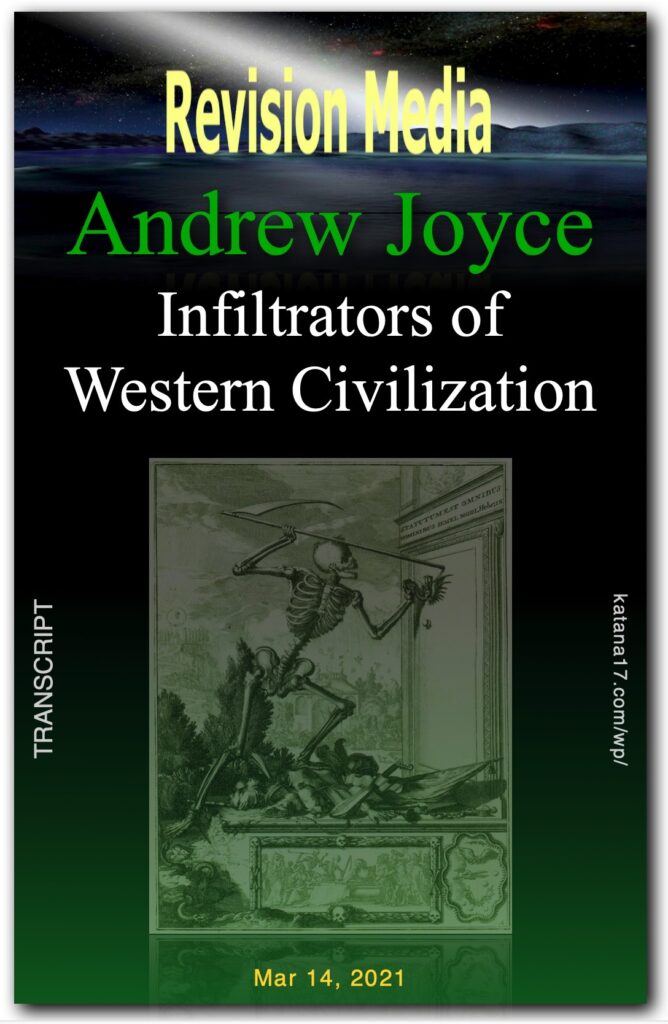
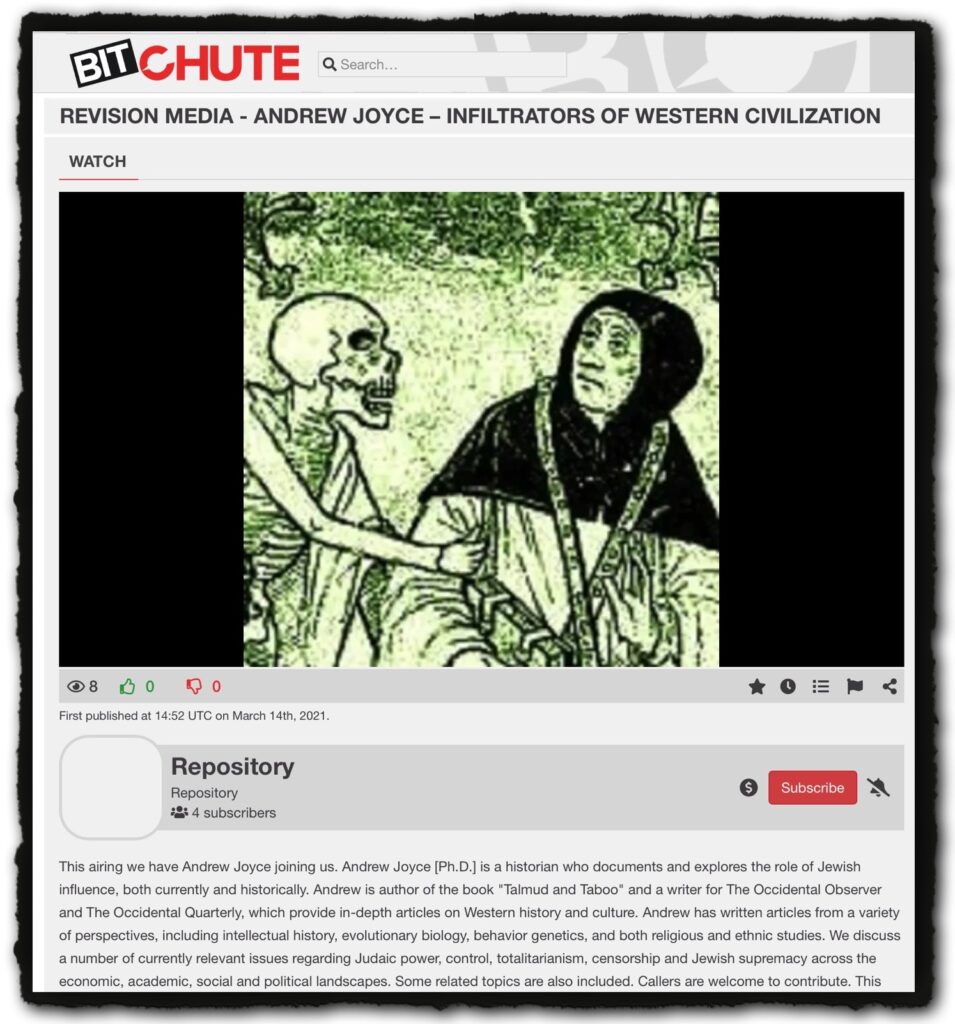


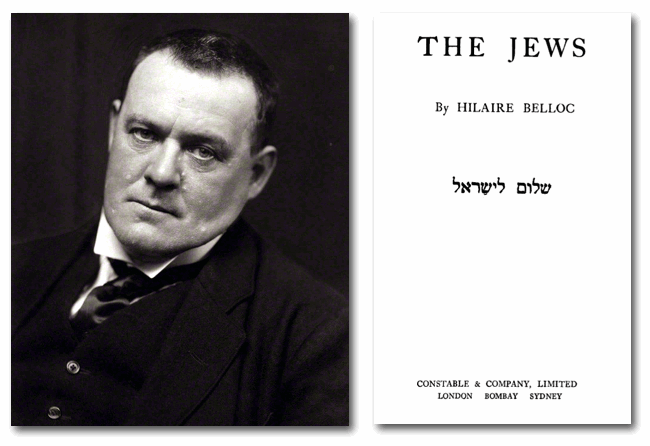
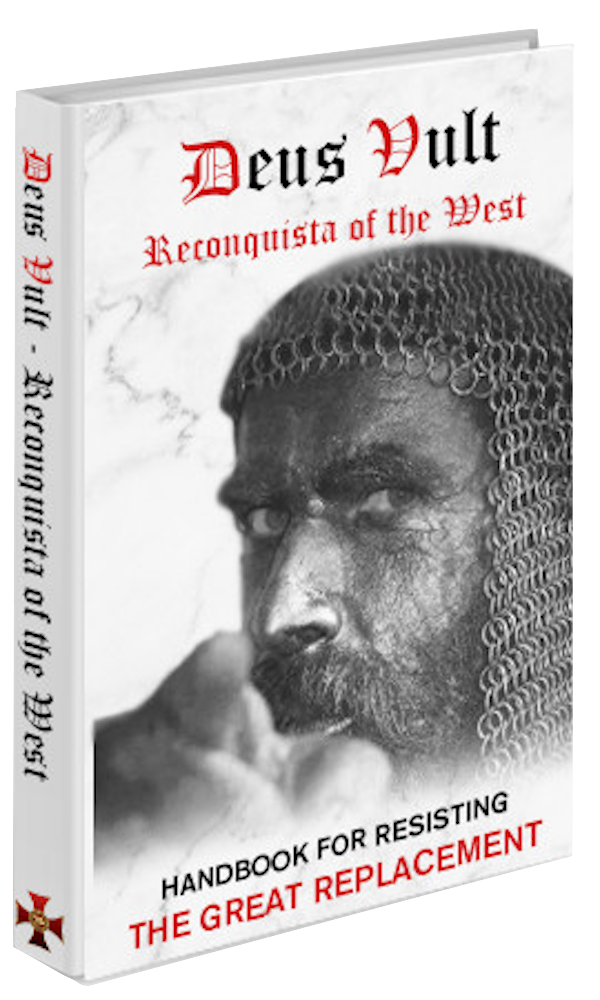
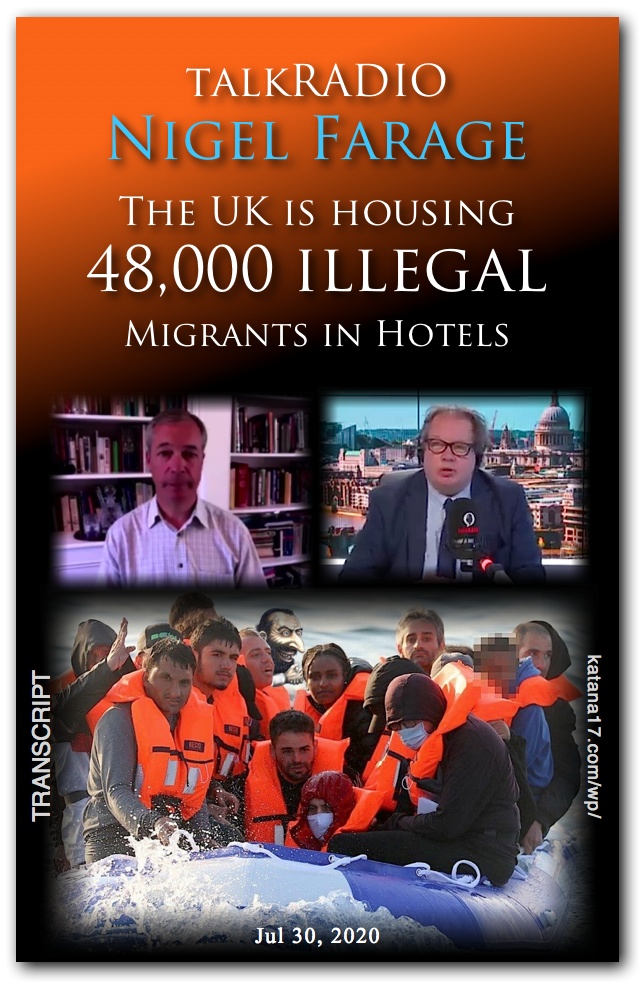
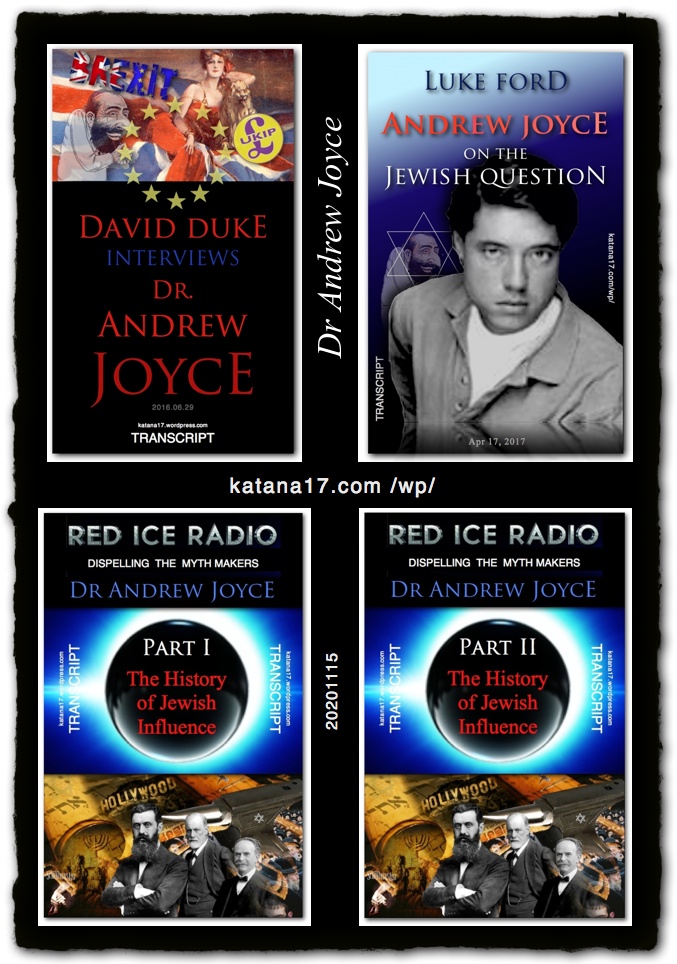
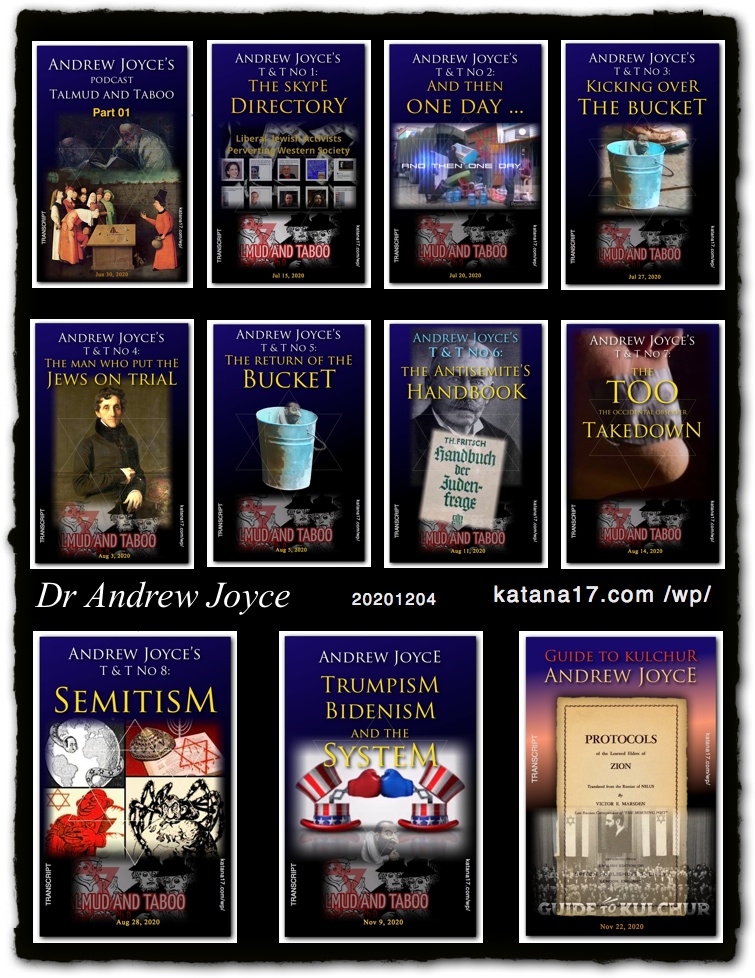
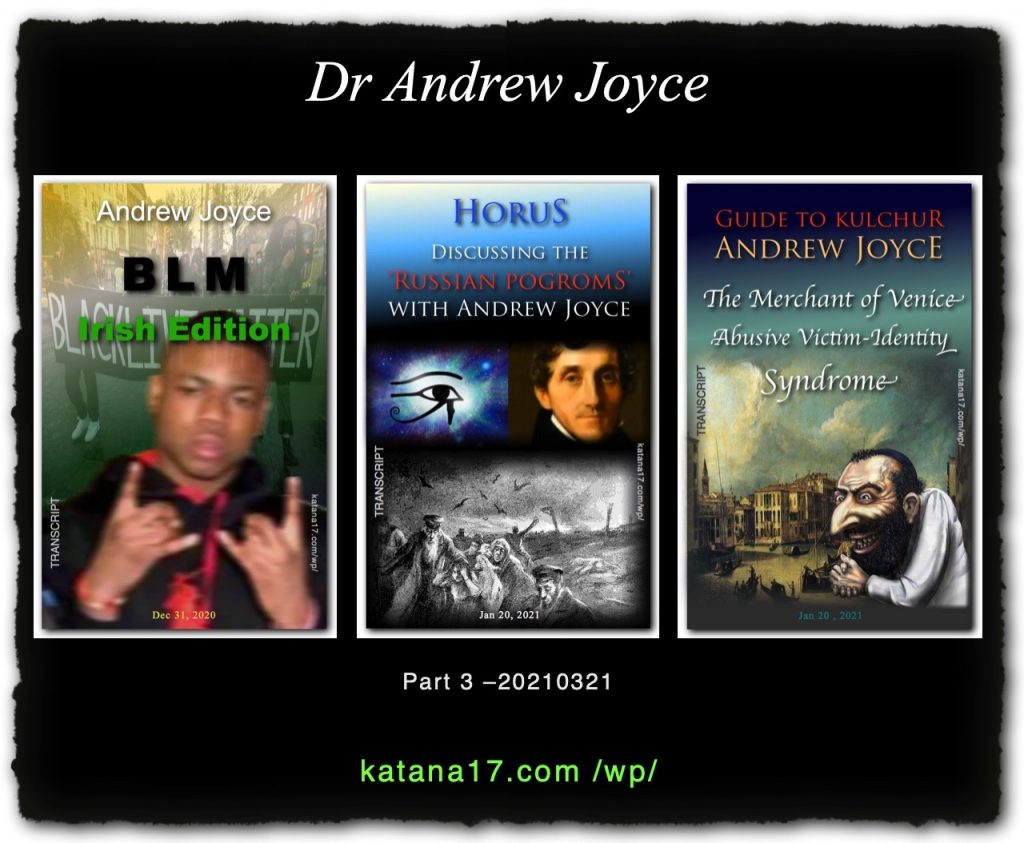
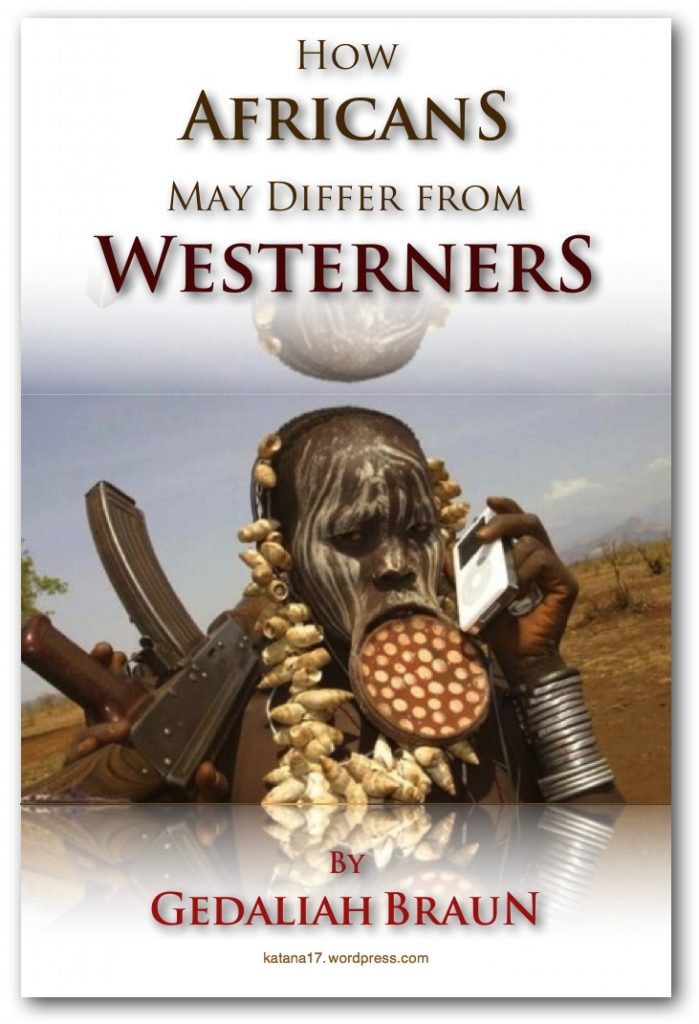
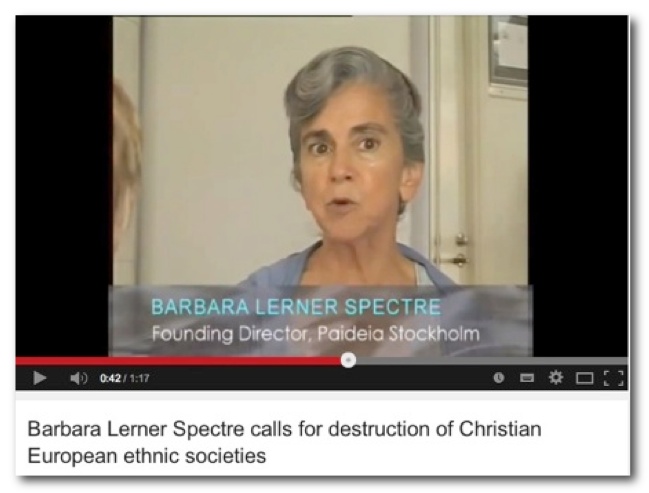
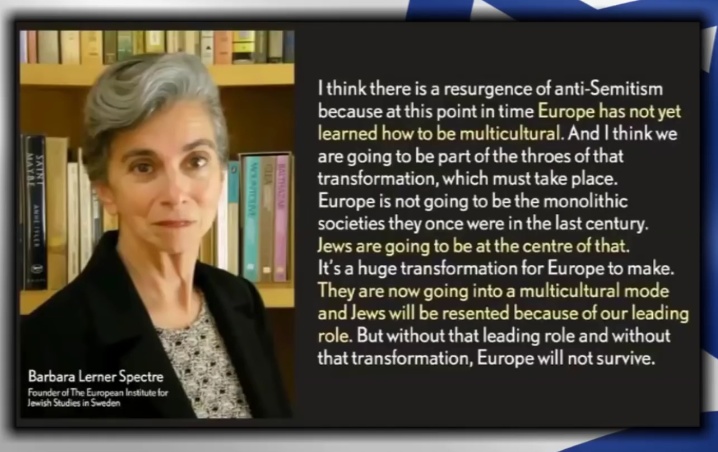
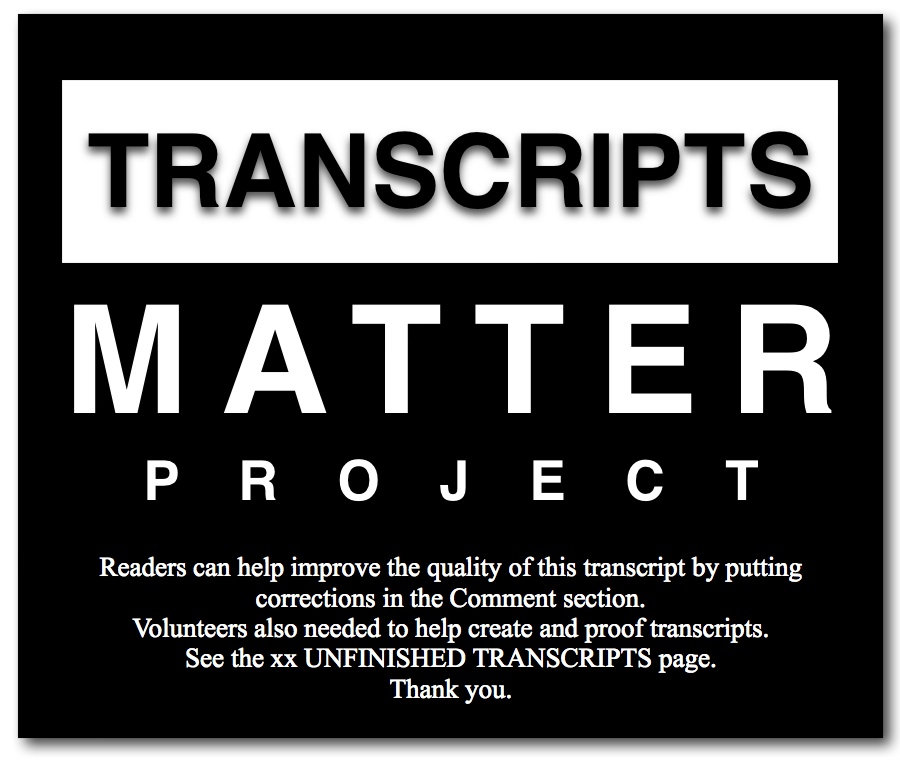
Thanks K17
Hey I like “K17”.
Pingback: Greg Johnson – The Ayatollah on Counter-Currents Radio – Sep 10, 2022 – Transcript | katana17